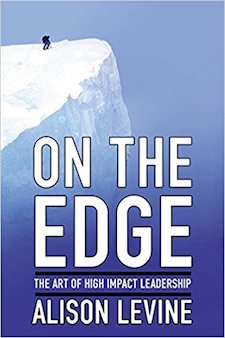Levine’s Book “On the Edge” Demonstrates the Importance of Leadership in VUCA Environments
By: Alison Levine"Leadership cannot be left to one person with a certain title or a certain amount of tenure."
TLDG Faculty Member and author of the best-selling book “On the Edge: The Art of High Impact Leadership”, Alison Levine is an expert on extreme environments. She served as the team captain of the first American Women’s Everest Expedition and, in May 2010, completed the Adventure Grand Slam — climbing the highest peaks on every continent and skiing to both Poles, an accomplishment fewer than 30 people in the world can claim. Alison spoke with us about the leadership challenges and lessons that come with operating in a VUCA (volatile, uncertain, complex, ambiguous) environment and how they translate to the corporate world.

What are some of the VUCA factors/challenges you’ve faced in extreme environments?
On a high-altitude expedition, nothing is ever certain. Everything around you is constantly shifting and changing, and how well you adapt to these changes and unexpected circumstances will determine your success or failure. The weather is a pretty obvious factor that you cannot control, but there are other things that can shift/turn quickly as well. Your health, the health of the team, the conditions of the route, the condition of your gear; all of these things will affect your climb and you can’t really control any of it. You have some degree of control over the condition of your gear, but there can still be variability. You can have an oxygen tank malfunction, you can have a tent get shredded by high wind, you can bust a crampon, etc. Big mountains are horrible places for control freaks.
How have your experiences leading in a VUCA environment shaped you as a leader?
VUCA environments have taught me the importance of empowering everyone on the team to think and act like a leader. Leadership cannot be left to one person with a certain title or a certain amount of tenure, because if everyone is relying on one person to make decisions and call the shots — and then that person is no longer able to fill that role — then the team will be unable to continue functioning and performing at a high level (or maybe at any level). On my 2008 South Pole Expedition, our team leader Eric Philips had everyone on the team trade off in various leadership roles. Every day he asked a new person to be out front, breaking trail, navigating the route, assessing crevasse dangers, etc. This was brilliant because it not only helped all of us strengthen our skills, it also ensures that if something had happened to Eric (God forbid) the rest of the team would know how to continue.
How can you help leaders learn to adapt or be more agile in a VUCA environment?
The key to surviving in a VUCA environment is to be ready to take action based on the situation and not based on the plan. Because whatever plan you came up with last year/last month/last week/that morning is going to be outdated as soon as it’s finished if you are in an environment that is shifting and changing. Of course, it’s important to plan because plans keep you organized and keep you on track, but you can’t be hell-bent on sticking to that plan. You have to be much more focused on taking action based on what is going on at the time. Improvisation skills are just as important as the ability to orchestrate a plan.
What are some of the similarities that corporate leaders face in today’s VUCA environment?
Corporations are also dealing with constantly changing landscapes. One of the most important lessons I learned in the mountains that also applies to the business leaders is that it’s is okay to feel scared or intimidated as long as you TAKE ACTION, because complacency will kill you. You have to be able to act and react quickly when you are in environments that are constantly shifting and changing, and I think everyone would agree that the business world is changing faster than ever. You will never have 100% certainty on most things when you are making decisions. But you don’t have to have absolute clarity in order to keep moving.
Levine’s book is available for purchase at Amazon.
"Improvisation skills are just as important as the ability to orchestrate a plan."